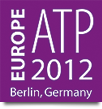
- SAP Community
- Groups
- Interest Groups
- SAP Learning Groups
- SAP Learning
- Blog Posts
- What drives IT #Certification?
- Subscribe to RSS Feed
- Mark as New
- Mark as Read
- Bookmark
- Subscribe
- Printer Friendly Page
- Report Inappropriate Content
Why do IT companies run certification programmes and why do people get certified? Here is what I learned at the European Association  of Test Publishers (EATP) conference in Berlin, last month.
of Test Publishers (EATP) conference in Berlin, last month.
This conference is one of the main events for the assessment and certification industries. SAP Global Certification Director, Sue Martin, was the conference chair, and there were around 250 attendees in total. What I’m reporting here is general for the industry, and not SAP specific.
Reasons to certify vary between employees, employers, vendors and partners:
Drivers for employees to get certified are often to get or improve a job. There is evidence (across the industry generally) that being certified in appropriate technologies increases your salary. For instance, one recent report suggests that professionals who had earned an IT or project management certification during the past five years earned an average salary of $2,720 more than their counterparts. But interestingly, one vendor at the EATP conference reported that they’d surveyed their test-takers and by far the biggest reason to get certified was to learn and develop their skills, not to get a salary increase or a specific job.
For employers, the main drive to get their people certified is that they need their IT systems to work well. IT success or failure can make the difference between corporate success and failure, and although certification on its own doesn’t ensure high performance, evidence suggests that performance is better in teams with a high proportion of certified individuals. To quote a 2011 IDC report: “While not a guarantee of success, certifications represent rigorously developed and meaningful bodies of knowledge. When teams are certified on relevant technologies — especially those being implemented within an organization for the first time — their likelihood of success increases.”
For vendors (again in the IT industry generally), the drive to certification is not usually to make money from certification fees. Setting up a certification programme involves a lot of effort from scarce, highly skilled people – you need leading edge experts to write and review questions. The main driver for certification is that the vendor needs people deploying its software to know its software in depth and to know best practices for deployment. Long term success comes from customers deploying your software successfully, and this usually requires expertise – certification is a way to define the expertise needed and encourage people to gain it. It also gives your lead users and consultants a reason to stay involved, and it helps establish a community with pride in the vendor’s products.
And lastly partners. Many partners (including resellers and consultants) get certified because their vendor strongly encourages it or makes it a requirement of a partner programme. It’s part of the price of being a partner. Most partners recognize that certification also gives a marketing benefit and also makes it more likely they will give a better service.
No-one suggests that certification on its own ensures project success. What the wider IT certification community believes is that the evidence shows that providing it is combined with experience, good project management and realistic business aims, certification helps make IT projects more likely to succeed. And this is why most successful IT vendors have a certification programme.
One key trend in IT certification is to take certification to the test-taker. Many test-takers have to go to a specialized “test center” to take an exam, which involves travel and cost. There is a move to deliver exams more in vendor, partner or customer offices, and also to deliver certifications at events like conferences.
Another trend is to make certification questions less focused on specific knowledge about software and more about applying the knowledge. This is sometimes done by software simulation, and often by improved curriculum design and the use of scenario and application questions – focusing on job roles and good deployment practices more than software functionality.
Security is a continued concern. A typical estimate is that a 100-question exam costs US$100,000 to create, taking into account all the design, review and validation that goes into the questions. There is concern about question leakage and exposure, for example on braindump sites. Vendors take technical measures to deal with this by randomizing and adapting tests and by discouraging test-takers from passing questions onto others.
I hope you find this insight into the conference useful. Watch this space – I’ll follow up this blog entry with a further one describing the session I co-presented at the conference, with Sue Martin and Ralf Kirchgaessner of SAP, including how SAP manage e a certification programme with exams available in up to 20 languages.
You must be a registered user to add a comment. If you've already registered, sign in. Otherwise, register and sign in.
-
Application Development for SAP HANA Cloud
2 -
Developing with SAP Extension Suite
9 -
Developing with SAP Integration Suite
5 -
General
139 -
Introducing SAP Analytics Cloud
4 -
Learning Content
128 -
Live Sessions
7 -
Low-Code - No-Code Applications and Automations for Citizen Developers
6 -
Modeling in SAP HANA Cloud
2 -
Practice Systems
7 -
Provisioning and Administration with SAP HANA Cloud
5 -
SAP Certification
14 -
SAP Learning Class
7 -
Technology Updates
1
| User | Count |
|---|---|
| 5 | |
| 3 | |
| 2 | |
| 2 | |
| 1 | |
| 1 | |
| 1 | |
| 1 |